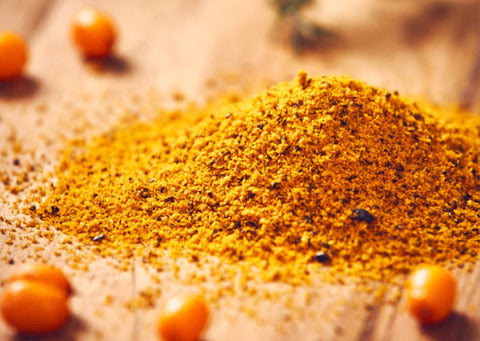Sea buckthorn, a resilient shrub native to Europe and Asia, has been celebrated for its myriad of health benefits for centuries. Its uses range from traditional medicine to modern dietary supplements. Recent scientific studies have shed light on the extensive therapeutic potential of this remarkable plant, particularly in the areas of antioxidant activity, anticancer properties, anti-hyperlipidemia effects, and anti-obesity benefits.
Antioxidant Activity
Sea buckthorn's potent antioxidant properties have been confirmed through numerous in vitro and in vivo studies. Its phenolic fraction has demonstrated the ability to inhibit plasma lipid peroxidation and protein carbonylation, key markers of oxidative stress. This inhibition can be especially beneficial for individuals exposed to oxidative stressors, such as hydrogen peroxide or H2O2/Fe. Sea buckthorn's phenolic constituents have shown promise in reducing the concentration of carbonyl groups in plasma proteins, further supporting its antioxidative capabilities.
In vitro trials have also revealed that sea buckthorn extract, either alone or in conjunction with medications like atorvastatin, effectively reduces oxidative damage caused by lipid peroxidation. Moreover, sea buckthorn leaf extract has demonstrated the ability to combat intracellular oxidative stress, potentially enhancing cell viability and membrane integrity.
Clinical studies further support these findings, with evidence indicating that sea buckthorn fruit can lower blood cholesterol levels and reduce inflammation and oxidative stress parameters, thereby contributing to cardiovascular health. Sea buckthorn seed oil has also exhibited its prowess by inhibiting ultraviolet-induced redox balance disturbances in skin cells.
Anticancer Activity
Emerging research suggests that sea buckthorn contains bioactive components with significant anticancer potential. Polyphenols found in sea buckthorn, particularly kaempferol and its derivatives, have displayed remarkable anti-colon cancer activity both in vitro and in vivo. They achieve this by regulating microRNA expression and arresting the cell cycle, thus inhibiting colon cancer proliferation.
In addition to its potential against colon cancer, sea buckthorn leaf aqueous extract has been found to target androgen receptors and inhibit the proliferation and migration of prostate cancer cells. Furthermore, sea buckthorn leaf extract has demonstrated potential in reducing glioma cell proliferation, indicating its possible use in glioma treatment. Isorhamnetin, another active component of sea buckthorn, has shown promise in promoting apoptosis in gastric cancer cells by affecting the PI3K-AKT-mTOR signaling pathway.
While these findings are promising, more in-depth in vivo experiments and clinical trials are needed to fully understand the anticancer effects of sea buckthorn in humans. Additionally, the anticancer potential of sea buckthorn carotenoid extracts remains an exciting avenue for future research.
Anti-Hyperlipidemia Activity
High cholesterol levels pose a significant risk factor for cardiovascular disease. Sea buckthorn contains phytosterols, found in its pulp's lipids, which play a crucial role in preventing hypercholesterolemia. Clinical trials have shown that sea buckthorn berries and extracts significantly improve cholesterol profiles in individuals with hyperlipidemia.
Animal studies support these findings, with flavonoid-enriched extracts from sea buckthorn seed demonstrating anti-hyperlipidemic effects by improving lipid metabolism and reducing inflammation. Furthermore, sea buckthorn fruit oil extract has been found to attenuate metabolic dysfunction in animals with hyperlipidemia, emphasizing its potential for the treatment and prevention of cardiovascular diseases.
Anti-Obesity Activity
Obesity is a global health concern, and sea buckthorn shows promise in combating this issue. Sea buckthorn polysaccharides have been found to activate brown adipocytes, promote thermogenesis, and inhibit lipid accumulation, ultimately reducing weight gain. Additionally, palmitic acid-rich sea buckthorn fruit oil extract has been effective in reducing weight and controlling blood sugar elevation in hyperlipidemic hamsters.
Clinical studies have also indicated that sea buckthorn can significantly reduce body weight gain, making it a potential candidate for developing functional foods and dietary supplements for obesity management. Sea buckthorn powder, made using low-temperature freeze-drying technology, has been shown to influence gut microbiome composition and structure, further supporting its anti-obesity potential.
Sea buckthorn, a versatile plant with a rich history of medicinal use, offers a wide array of health benefits. Research has unveiled its potent antioxidant properties, anticancer potential, anti-hyperlipidemia effects, and anti-obesity benefits. While the evidence is compelling, ongoing research is needed to fully understand and harness the potential of this remarkable plant in promoting human health. As science continues to unlock its secrets, sea buckthorn remains a promising natural resource for a variety of health-related applications.
Reference: (2022, December 6). Phytochemistry, Health Benefits, and Food Applications of Sea Buckthorn (Hippophae rhamnoides L.): A Comprehensive Review. Frontiers in Nutrition, 9, Article 1036295. DOI: 10.3389/fnut.2022.1036295






0 comments